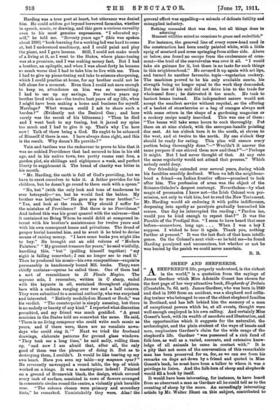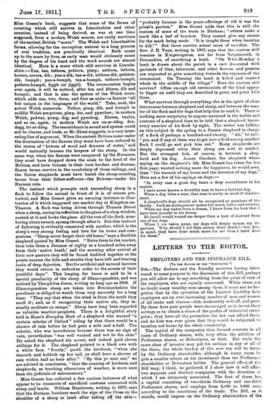SHEEP AND SHEPHERDS.
"A SHEPHERD'S life, properly understood, is the richest in the world," is a quotation from the sayings of James Gardner which Miss Adelaide Cosset has chosen for the first page of her very attractive book, Shepherds of Britain (Constable, 7s. 6d. net). James Gardner, who was born in 1840 and died in 1900 from an accident, was a shepherd and collie- dog trainer who belonged to one of the oldest shepherd families in Scotland, and has left behind him the memory of a man of exceptional powers which he, at all events, thought were well enough employed in his own calling. And certainly Miss Gosset's book, with its wealth of anecdote and illustration, and the opportunities which it suggests for the naturalist, the archaeologist, and the plain student of the ways of beasts and men, emphasizes Gardner's claim for the wide range of the shepherd's life. Gardner " was possessed of a rich fund of folk-lore, as well as a varied, accurate, and extensive know- ledge of all animals he came in contact with." It is a pity that not more of the conversation of this remarkable man has been preserved for us, for, as we can see from his remarks on dogs set down by a friend and quoted in Miss Gosset'a hook, he must have been a talker to whom it was a privilege to listen. And the folk-lore of sheep and shepherds would fill a book by itself.
It would have been interesting, for instance, to have beard from so observant a man as Gardner all he could tell as to the counting of sheep by the score. An exceedingly interesting article bs Mr. Walter Skeat on this subject, contributed to Miss Gosset's book, suggests that some of the forms of counting which still survive in Lincolnshire and other counties, instead of being derived, as was at one time supposed, from a modern Welsh source, are really survivals of the ancient British "score." The Welsh and Lincolnshire forms, allowing for the corruption natural to a long process of oral tradition, are practically identicaL Both count up to the score by fives, as early man would obviously count by the fingers of his hand and the word sounds are almost identical. Here is a score which still survives in Lincoln- shire :—Yan, tan, tethers, pethera, pimp; setbera, lethera, hovera, covers, dik ; yan-a-dik, tan-a-dik, tethera-dik, pethera- dik, bumpit ; yan-a-bumpit, tan-a-bumpit, tethers-bumpit, pethera-bumpit, figgit (or jiggit). The enumeration begins over again, it will be noticed, after ten and fifteen, dik and bumpit; and that is also the system of the Welsh score, which adds one, two, three, and four as units—a feature "all but unique in the languages of the world." Take, next, the actual Welsh numerals. Pether, pimp, dik, and bumpit in middle Welsh are petuar, pimp, dee, and pymtheo ; in modern Welsh, pedwar, pump, deg, and pymtheg. Eleven, twelve, and so on, again, in modern Welsh are un-ar-ddeg, deu- degg, tri-ar-ddeg. The resemblance in sound and system could not be clearer, and leads, as Mr. Skeet suggests, to a very inter- esting line of argument. When the ancient Britons came under the domination of the Saxons they must have been reduced to the status of " hewers of wood and drawers of water," and would naturally become the keepers of the sheep. In the same way, when the Saxons were conquered by the Normans, they must have dropped down the scale to the level of the Britons, and have become in their . turn herders and drovers. Saxon terms survive in the vocabulary of those callings, and the Saxon shepherds must have learnt the sheep-counting terms from their fellow-sufferers—the Britons—under the Norman rule.
The instinct which prompts each succeeding sheep in a flock to follow the animal in front of it is of course pro- verbial, and Miss Gusset gives an amusing instance in illus- tration of it which happened one market day at Kingston-on- Thames. A flock was being driven through Thames Street when a sheep, seeing its reflection in the glass of a shop window, rushed at it and broke the glass. All the rest of the flock, num- bering about twenty, sprang through after it. But this instinct of following is evidently connected with another, which is the sheep's very strong feeling and love for its home and com- panions. "Sheep never forget their old home," says a Scottish shepherd quoted by Miss Gosset. " Drive them to the market, then take them a distance of eighty or a hundred miles away from their • native heath,' and the morning after arrival at heir new pasture they will be found huddled together at the points nearest the hills and stratbs they have left and Wearing looks of deep dejection. Bat for artificial and natural barriers they would return in unbroken order to the scenes of their youthful days." This longing for home is said to be a special peculiarity of the sheep of Glamorganshire, and was noticed by Theophilus Jones, writing so long ago as 1809. If Glamorganshire sheep are taken into Brecknockshire the purchaser is obliged to watch them very narrowly for a long time. "They say that when the wind is from the south they smell it ; and, as if recognizing their native air, they in- stantly meditate an escape." Sheep have long been regarded as valuable weather-prophets. There is a delightful story told in Hone's Everyday Book of a shepherd who warned "a certain scholar of Oxford" riding by that there would he a shower of rain before he had gone a mile and a-half. The scholar, who was incredulous because there was no sign of rain, nevertheless " was well washed and wet to the skin." He asked the shepherd his secret, and indeed paid eleven shilings for it. The shepherd pointed to a black ewe with a white face. " Surely," quoth the berdman, "when she danceth and holdeth up her tail, ye shall have a shower of rain within half an hour after." " By this ye may see," we are advised in conclusion, "that the cunning of herdmen and shepherds, as touching alterations of weather, is more sure than the judicials of astronomony."
Miss Gosset has collected a few curious instances of what appear to be remnants of sacrificial customs connected with sheep and lambs. William Henderson, writing in 1879, says that the Durham butchers mark the sign of the Cross on the shoulder of a sheep or lainb after taking off the skin-
" probably because in the peaCe-offerings of old it was the priest's portion." Miss Cosset adds that this is still the custom of some of the trade in Durham ; "others make a mark like a leaf of bracken. They cannot give any reason for the mark being made. ' It is taught them when learning to kill.' " But there survive actual eases of sacrifice. The Rev. J. E. Vaux, writing in 1902, says that the custom still
remains in Kingsteignton, not far from aseignniouth, in Devonshire, of sacrificing a lamb. "On W hit-Monday a lamb is drawn about the parish in a cart decorated with garlands of lilac, laburnum, and other flowers, and persons are requested to give something towards the expenses of the ceremonial. On Tuesday the lamb is killed and roasted whole in the middle of the village." Does the custom still survive? Often enough old ceremonials of the kind appear
to linger on until they are described in print, and print kil!s them.
What survives through everything else is the spirit of close intercourse between shepherd and sheep, and between the mas- ter of the flock and the dogs that help him to tend it. There is nothing more surprising to anyone unversed in the habits and customs of a shepherd than to be told that a shepherd knows every member of his flock by sight. The writer was talking on this subject in the spring to a Sussex shepherd in charge
of a flock of perhaps a hundred-and-twenty. " he said.
" yes, and if any of them was to get into a field among another flock I could go and pick him out." Many shepherds are deeply depressed when their sheep are sold at market. But the strongest link, of course, is between a shep- herd and his dog. James Gardner, the shepherd whose saying, on the shepherd's life Miss Gosset has taken for her first page, wanted nothing more for happiness, he would aver, than "the warmth of my home and the devotion of my dogs." Here are a few of his sayings on dogs :- "In every case a great dog bears a deep resemblance to his master.
I have never known a deceitful man to have a faithful dog. When a dog bites a man, that man is sorely in need of chastise- ment.
A. shepherd's dogs should all be recognized as members of the family. Such an arrangement makes life much fuller and sweeter. When my dog wakes from a dream, I know from his look that I have been present in his dream.
No insult would wound me deeper than a look of distrust from one of my dogs.
When I am taken away, my dogs will deeply mourn my de- parture. Why should I not then mourn their death 9—for, bear in mind, they have done much more for me than I have doss for them."











































 Previous page
Previous page